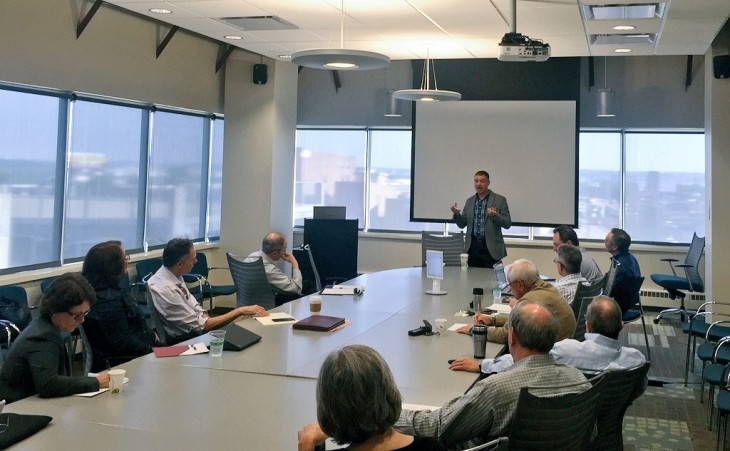
Wael Mourad (head of table) speaks to the KC Digital Drive Health Innovation Team at MARC, May 27, 2015.
From its base in Grandview, Mo., The Medina Clinic provides low-cost health care and a variety of simple but powerful digital health services to some 800 Kansas Citians per year.
As co-founder Wael Mourad, a family physician Truman Medical Center Lakewood, told the KCDD Health Innovation Team this past week, The Medina Clinic focuses on the underserved and uninsured.
“Throughout my training I developed the belief it is very, very important to take care of patients who are underserved,” Mourad told the group. “Even if I don’t make any money, I resolved to do that for the rest of my career.”
Staffed largely by volunteers and focusing on teaching physicians in training, The Medina Clinic charges customers a flat $15 out-of-pocket fee to meet with a physician. Though they do take insurance, including private providers as well as Medicare and Medicaid, the clinic saves costly human-resources expenses largely by avoiding the insurance billing process.
The same applies to digital services. Open every weekend since 2010, the clinic recently scaled back to being open Saturdays only. For patients who cannot make the narrow time slot or who cannot travel, the clinic offers online doctor consultations, or “eClinic” visits, via webcam for a flat $10 fee.
Other electronic services The Medina Clinic offers include online lab results ordering (e.g. $3 for a cholesterol test), electronic medical records, and online prescription ordering for doctors.
The eClinic webcam service is provided through a secure software application. When a patient schedules an appointment through the Medina website, an email is sent that walks the patient through downloading the secure app to their computer and conducting the appointment. “We’ve found that even our less-tech-savvy patients find it easy to use,” Mourad said.
The challenge is ensuring a working webcam and a solid internet connection on the patient’s end.
For that, Mourad hinted that they are exploring potential upgrade options leveraging Kansas City’s tech infrastructure. “You’ve got Cerner here, you’ve got Google Fiber, so we feel Kansas City is an ideal location to continue to work on this idea,” Mourad said.
Currently, only three to four patients a month use the eClinic service. Mourad attributes that mainly to a lack of awareness about the service. Mourad plans to focus on increasing the clinic’s digital offerings in the coming months.
To inform that process, he will pursue a project through the graduate program at the Harvard School of Public Health. As part of his coursework, he will develop a plan for a community-oriented eClinic network that will create access points in local churches, community centers, and other places where patients can access telehealth services with the on-hand help of a tech-savvy nurse or other healthcare worker.
Though Mourad voiced uncertainty about whether telehealth apps could ever provide the “human touch” of in-person clinical visits, it’s certainly a step in the right direction for bringing better services to people who need it most — often in the comfort of their homes.
“The benefits are self-explanatory,” said Mourad. “It’s another means of access.”
Learn More about Local Health Pilots: Join us June 22 for the Digital Health Innovation Forum – Register Free
